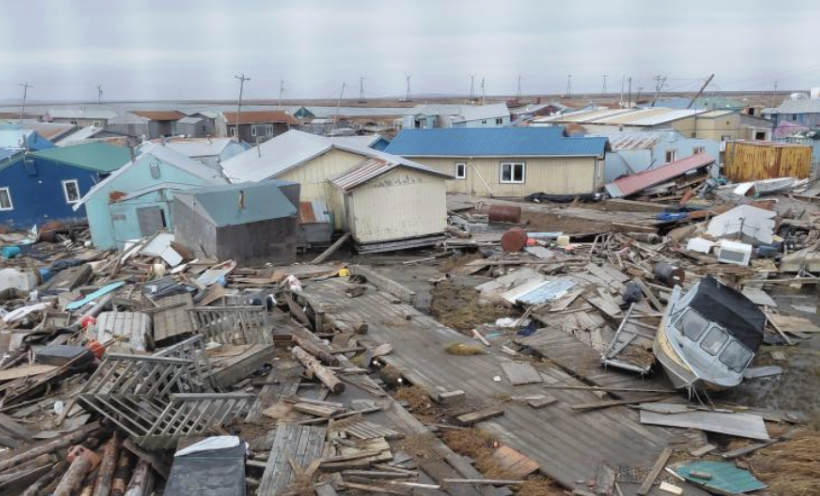
- Details
- By Native News Online Staff
Within days of the storm, Alaskans have raised more than $1 million to help evacuees recover from one of the most destructive natural disasters in the state’s recent history. According to a press release from the Alaska Community Foundation, the fund will address both urgent humanitarian needs and the sustained recovery required to rebuild villages and critical infrastructure.
Typhoon Halong brought hurricane-force winds and catastrophic flooding to some of Alaska’s most remote communities, wiping out homes, roads, runways, and essential services. Entire villages have been cut off from power and supplies. Approximately 2,000 residents have been evacuated to Anchorage for temporary shelter, and many may need permanent housing as recovery and rebuilding plans are developed.
The first round of grants will be distributed within days to fund critical needs, including housing, transportation, food, and emergency supplies. Subsequent phases will support long-term recovery, helping communities rebuild infrastructure and chart a path forward.
“Through our work across Alaska, we’ve learned that the most effective disaster response is locally led,” said Megan Cacciola, ACF VP of programs and grants, in a press release. “That’s why this partnership with Alaska Native and regional organizations is so powerful. The communities are leading the way, with statewide support.”
More Stories Like This
Gwich'in Tribal Governments Submit Comments Challenging Fish and Wildlife Service's Inadequate Environmental Review of Arctic Refuge Snow RoadRappahannock Tribe Challenges 9M-Gallon Water Plan
Feds release draft long-term plans for Colorado River management
Apache Leader Walks 60 Miles to Court Hearing That Will Decide Fate of Sacred Oak Flat
Rappahannock Tribe Raises Sovereignty and Environmental Concerns Over Caroline County Water Permit
Help us defend tribal sovereignty.
At Native News Online, our mission is rooted in telling the stories that strengthen sovereignty and uplift Indigenous voices — not just at year’s end, but every single day.
Because of your generosity last year, we were able to keep our reporters on the ground in tribal communities, at national gatherings and in the halls of Congress — covering the issues that matter most to Indian Country: sovereignty, culture, education, health and economic opportunity.
That support sustained us through a tough year in 2025. Now, as we look to the year ahead, we need your help right now to ensure warrior journalism remains strong — reporting that defends tribal sovereignty, amplifies Native truth, and holds power accountable.
 The stakes couldn't be higher. Your support keeps Native voices heard, Native stories told and Native sovereignty defended.
The stakes couldn't be higher. Your support keeps Native voices heard, Native stories told and Native sovereignty defended.
Stand with Warrior Journalism today.
Levi Rickert (Potawatomi), Editor & Publisher


